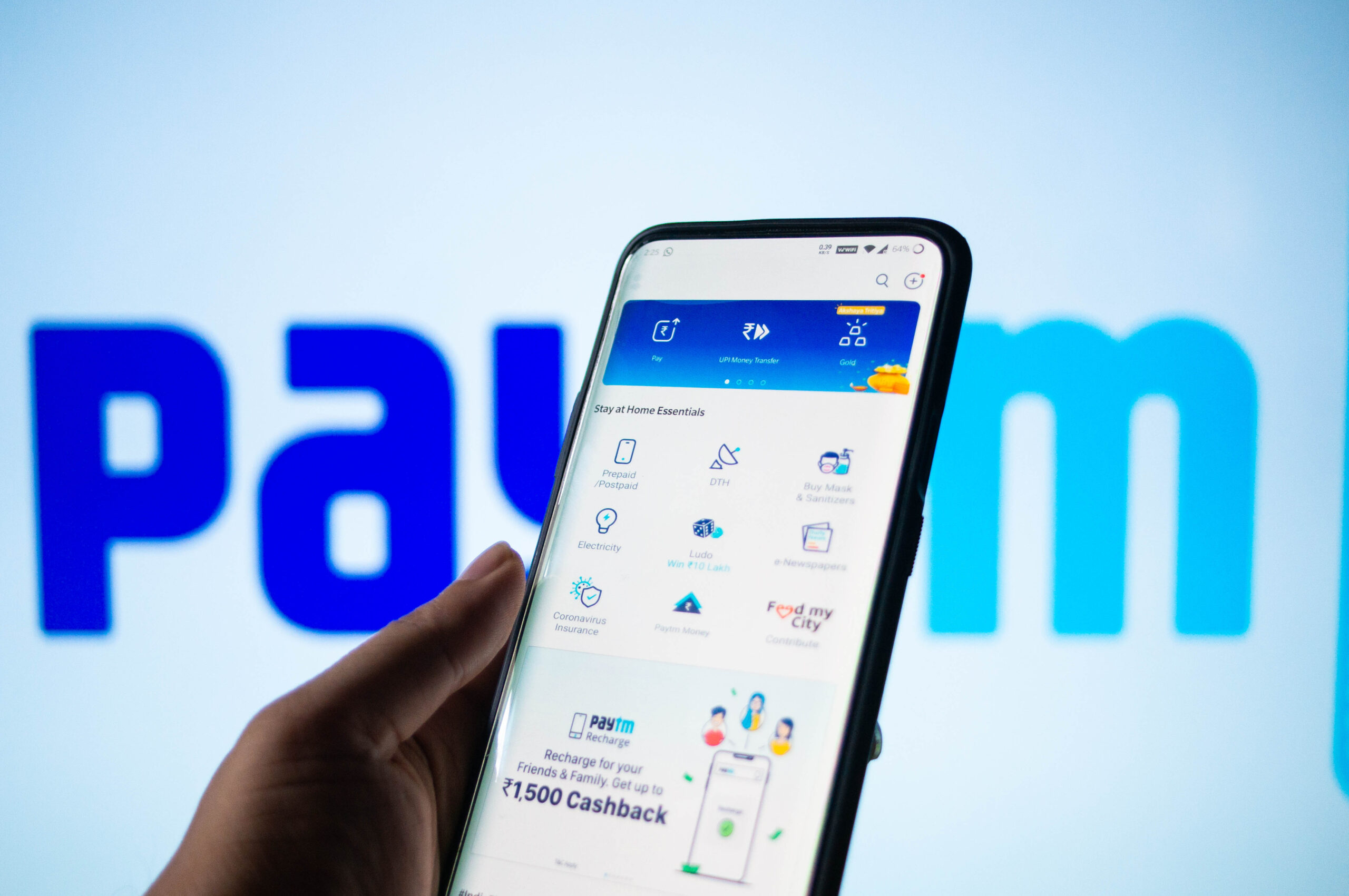Seeing Paytm’s promising business, mutual funds raised their stake in the company: Paytm’s profitability attracted many investors to get on board.

Seeing Paytm’s promising business, mutual funds raised their stake in the company: Paytm’s profitability attracted many investors to get on board.
Investors from all around the world were interested in Paytm’s initial public offering (IPO), which was the largest in the history of the country. Smart investors, both retail and institutional, are clamoring to add more Paytm stock to their portfolios as a result of the company’s spectacular development.
Investors’ faith in the Paytm story and the business’s long-term potential for success has become greater than ever as the fintech startup makes substantial progress toward achieving operating profitability.
Both its operating and financial statistics for Paytm have been growing steadily. The company has been able to significantly expand EBITDA before ESOP costs because of operating leverage and its exceptional sales and contribution profit growth.
According to the company’s most recent share ownership data for the quarter that ended in December, mutual funds raised their ownership by 0.47 percent to 1.73 percent. The number of mutual fund shareholders in Paytm increased from 19 to 21 in the December quarter as a result of the addition of two new mutual funds to the stock.
The shareholding structure showed that more retail investors have joined the party, with their ownership percentage rising by 3.0% to 9.7%. The total number of retail stockholders increased by over 70,000 during the quarter, reaching about 12 lakhs.
These changes show that more Indians have faith in Paytm’s capacity to generate profitability without sacrificing growth. The increase in domestic investors’ shares demonstrates their belief in the company’s potential for the future.

Paytm, a provider of financial services and digital payments, reported 76% year-over-year (YoY) revenue growth to Rs 1,914 crore in Q2FY23, while EBITDA before ESOP expense increased by Rs 259 crore, or 6% YoY.
The company reported significant traction across all of its operations, which enabled it to expand its sales more quickly and enhance EBITDA before ESOP costs (an improvement of Rs 200 crore in the last two quarters). It had a consistent rise in contribution profit of 224% YoY and 16% QoQ to Rs 843 crore.
The key driver of Paytm’s financial services income, which now represents 18% of the company’s overall revenue, up from 8% in Q2FY22, is the company’s rapid expansion in loan distribution. The total income from the financial services industry was Rs 349 crore, increasing 29% quarter over quarter and 293% year over year.
In November 2021, one 97 Communications Ltd., the company behind Paytm, launched its initial public offering (IPO) with a price range of 2,080 to 2,150 rupees. The public offering was met with muted interest from investors, and Paytm shares were listed at a discount of almost 9% to their upper price band of 2,150 per equity share.
Due to the company’s continuing platform expansion, stronger user engagement, expanding merchant base, and devices-led leadership in offline payments, the company’s payments business revenue increased by 56% YoY and 9% QoQ in Q2FY23.
The number of customers and retailers is increasing, and so is the company’s revenue stream. Due to its ability to increase payment volumes, subscription revenues, and the distribution of merchant loans, merchant subscriptions represent an alluring profit stream for the business.
The company stated: We continue to invest with discipline in areas where we see compelling monetization opportunities, including investments in our technology teams, targeted marketing for user acquisition and brand building, and a sales team to grow our merchant base and our merchant subscriptions.
The company went on to say that it believes the loan distribution industry has “a long development runway ahead of it” (Paytm postpaid, personal loans, merchant loans).

Paytm’s profitability attracted many investors
Over a year after Paytm entered the stock market, the company has already started to leave an impression on investors.
Foreign and domestic investors have shown interest in Paytm’s first public offering (IPO), the largest in the country’s history. Both retail and institutional traders are interested in Paytm due to its phenomenal growth and are trying to expand their holdings of the company’s stock.
Global investment giant Goldman Sachs anticipates that Paytm will reach adjusted earnings before interest, taxes, depreciation, and amortization (EBITDA) positive status by the quarter ending in March, two quarters earlier than anticipated and two quarters earlier than the company’s guidance for September 2023.
On pricing, Goldman’s note said, for a growth outlook that is better than or comparable to the peer group, Paytm’s value multiples are at a discount to the global/Indian peer group. According to our updated analysis, Paytm’s current share price is already factoring in several negative factors, with the stock trading close to its bear-case implied value; we see the risk-reward ratio as being biased to the upside.
Goldman Sachs has maintained its “Buy” rating for Paytm and raised its target price for the stock to Rs 1,120. According to the company, the current share price continues to present an attractive entry point into one of the largest and fastest-growing fintech platforms in India.
According to the digital payments company’s exchange filings, the holdings of retail investors doubled in the March quarter to 7.72 percent from 3.49 percent the quarter before.
On the other side, foreign portfolio investors (FPIs) raised their ownership of Paytm from 0.91% to 6.68%. A total of 128 FPIs held Paytm shares in the third quarter of FY23, an increase of 40 net new investors from the 88 investors in the second quarter.

Paytm is predicted to report yet another successful quarter in Q3FY23. According to American investment bank and financial services provider Goldman Sachs, Paytm would see revenue growth in Q3 of about 45% YoY and a further reduction in adjusted EBITDA losses (by 58% QoQ to -Rs0.7 billion).
According to the company’s papers, key investor Canada Pension Plan Investment Board (CPPIB) boosted its investment from 1.57 percent to 1.71 percent. However, several foreign investors pulled out of the company’s capital structure, as seen by the decline in FPI shareholding from 9.36% in the December quarter to 4.42% in the March quarter. The entire amount of FPI sales in Indian marketplaces for the March quarter reportedly totaled $14.5 billion.
Even though the company disclosed its shareholdings for Q4FY22, sources indicate that leading mutual fund houses and asset management firms (AMCs) in the country purchased fresh shares of One97 Communications Limited, the parent company of Paytm, as early as April (OCL).
The expansion of domestic shareholders is particularly encouraging for the Indian economy because it demonstrates that increasing numbers of Indians are funding the nation’s fast-expanding fintech industry.
A corporation may gain from a rise in retail shareholding in a variety of ways. Increased liquidity, which can help to stabilize the stock price and enhance market mood overall, is one of the most important advantages. Retail shareholders may be more inclined to keep their shares and have a longer investment horizon, which makes the company more appealing to investors.
The fintech company has led India’s technology-driven transition to a cashless economy as a leader in the country’s fintech revolution. A familiar name that is now associated with comfort and simplicity of use is the Paytm Super App.
When Paytm releases its third-quarter earnings, it is anticipated to have another successful quarter. According to its Q3 operating performance update, the number of monthly transacting customers, loan disbursals, and installed devices all increased significantly.
On the other side, Chinese e-commerce behemoth Alibaba sold off a small portion of its ownership in Paytm earlier this month. Alibaba appears to be leaving India as it has already sold some of its stock in other businesses like BigBasket and Zomato. The most recent share sale from this e-commerce player was to Paytm.
After Alibaba, Singapore sold its shares in Paytm, Morgan Stanley Asia (Singapore) acquired a new stake in the fintech firm, which has been badly impacted by the bear market. According to data on the NSE website, Morgan Stanley Asia (Singapore) purchased 54,95,000 shares of Paytm for a price of $534.80 per share. Morgan Stanley invested over $294 crore in Paytm shares, which have fallen nearly 45% in the past year.
Despite the sale of Alibaba.com, Paytm was nevertheless able to secure a 560 crore FII investment from Morgan Stanley and Ghisallo Master Fund on January 12, 2023, in a bulk open market transaction.
edited and proofread by nikita sharma




